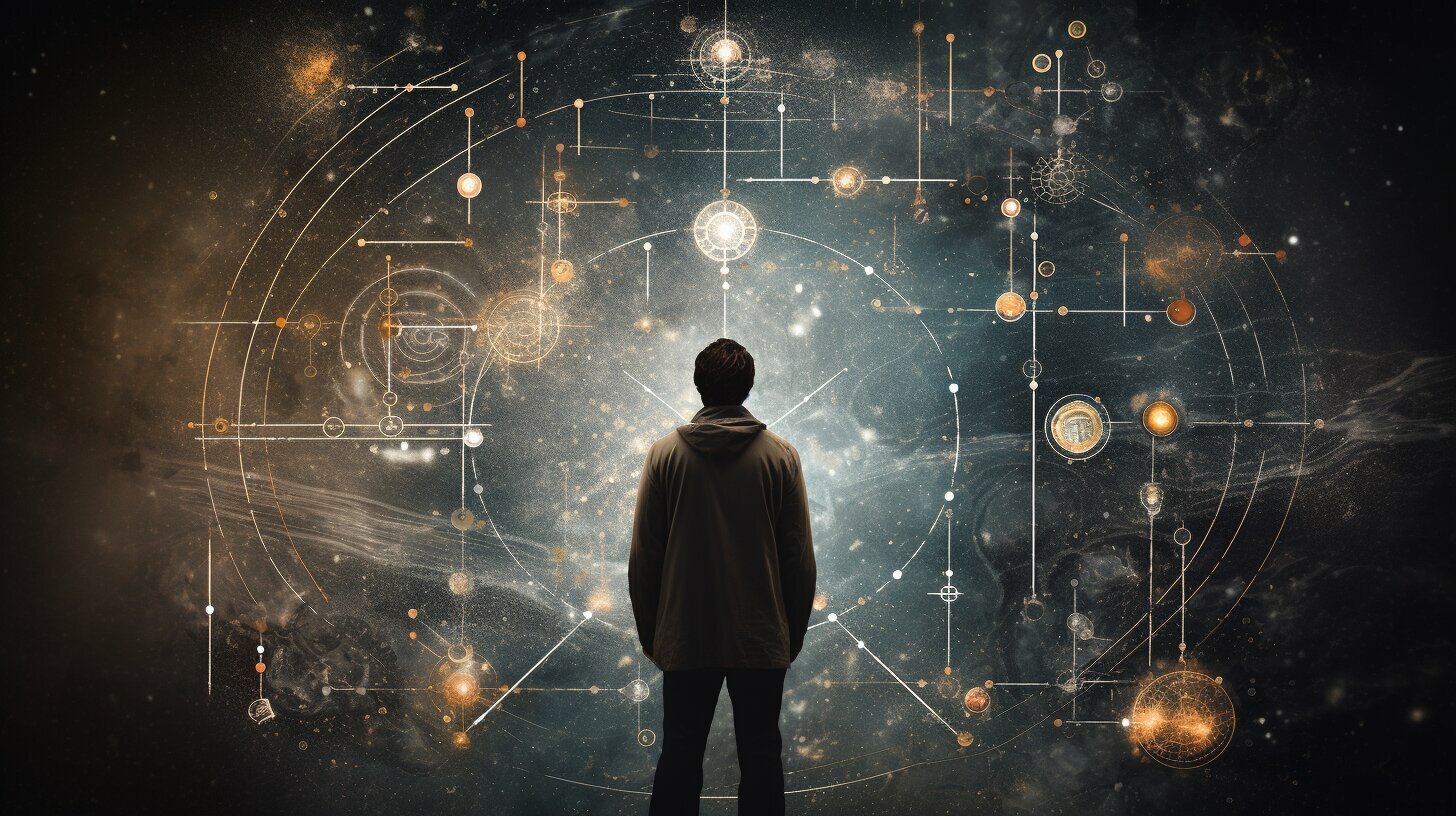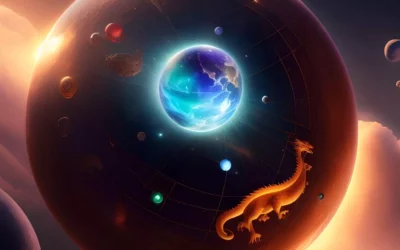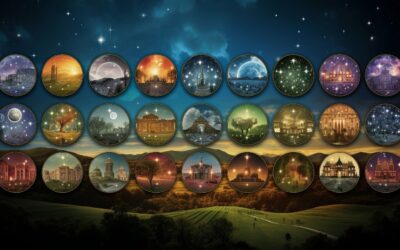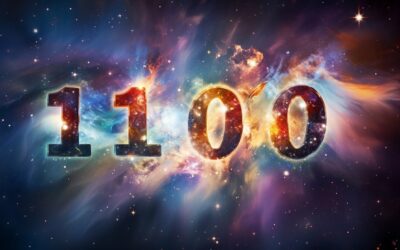I often encounter the question, “Is astrology real?” This question has been debated for centuries, and opinions on the validity of astrology vary widely. To answer this question, we must examine astrology from various angles, including its historical significance, scientific evidence, personal experiences, and cultural impact.
While some view astrology as a pseudoscience, others believe it to be a powerful tool for self-reflection and self-discovery. As we explore the different arguments for and against astrology, we must remain open-minded and approach the topic with a willingness to learn.
Key Takeaways:
- The question of whether astrology is real is a highly debated topic.
- Examining astrology from multiple angles can provide a broader understanding of its validity.
- It is important to approach the topic with an open mind and willingness to learn.
The Historical Significance of Astrology
To understand the reality of Astrology, it is essential to examine the historical significance of astrology to gain a deeper understanding of its impact on human beliefs. Astrology has been part of various cultures and civilizations for thousands of years.
Astrology’s roots can be traced back to ancient Babylonian times, where it was used to predict seasonal changes and understand natural occurrences. The Greeks, Egyptians, and Romans also practiced astrology, and it played a significant role in their cultural and religious beliefs.
Throughout history, astrology has been associated with myths and legends, and many believed that the alignment of the planets influenced human destiny and personality traits. During the Renaissance, astrology became increasingly popular among scholars and intellectuals, who used it to gain insights into human nature and the universe’s workings.
The Role of Astrology Today
Despite its long history, astrology faces skepticism and criticisms in modern society. Many consider it a pseudoscience and claim that its claims lack scientific evidence. Still, astrology continues to thrive globally, with many individuals relying on it for guidance and understanding.
As a spiritual teacher, I believe that astrology can provide valuable insights into one’s personality traits, strengths, and weaknesses. By exploring the psychological aspects of astrology, we can understand ourselves better and gain a deeper understanding of the human experience.
By examining astrology’s historical significance and cultural impact, we can gain a broader perspective on its validity and significance in society. Whether or not you believe in astrology, it’s essential to approach it with an open mind and understand its role in shaping human beliefs and culture throughout history.
The Role of Astrology in Modern Society
I have witnessed the impact astrology has on individuals and society. However, it is important to acknowledge the skepticism surrounding astrology and understand the criticisms against it.
One of the main arguments against astrology is that it is considered pseudoscience. Critics argue that the claims made by astrologers are not based on empirical evidence and are instead rooted in superstition and belief. Additionally, studies that have been conducted on astrology have often been criticized for lacking scientific rigor.
Another criticism of astrology is that it relies on the Barnum effect, a psychological phenomenon where individuals believe vague and general statements about themselves to be true. This means that astrological predictions and readings may seem personalized, but in reality, they could apply to anyone.
Despite these criticisms, astrology continues to have a significant role in modern society. Many individuals turn to astrology for guidance and insight into their lives. It is often used as a tool for self-reflection and self-discovery, providing individuals with a language to understand their thoughts and emotions.
Moreover, astrology has an impact on popular culture, influencing fashion, music, and art. It has become a trend among millennials, with astrology-themed merchandise, apps, and social media accounts gaining immense popularity.
Overall, the role of astrology in modern society is complex and multifaceted. While it may not be considered a science, it continues to impact individuals and society in significant ways. In the following sections, we will explore the different perspectives on astrology, examining its historical, scientific, and cultural significance.
The Scientific Analysis of Astrological Claims
Astrology has the power to offer insights and guidance. However, it is important to examine astrology from a scientific perspective to determine its validity. In this section, I will analyze the scientific aspect of astrology and the evidence supporting or debunking its claims.
Many skeptics argue that astrology is pseudoscience and lacks empirical evidence. However, there have been studies conducted that provide evidence supporting astrology. For instance, a study conducted in 2018 by researchers at the University of California found a correlation between the position of the moon and the quality of sleep that participants reported having. Another study published in the Journal of Social Sciences found a correlation between astrology and personality traits.
However, it is important to note that these studies have been met with criticism and skepticism from the scientific community. Critics argue that the studies do not meet the standards of rigorous scientific methodology and do not rule out other factors that may influence the results. Additionally, there is a lack of replicable studies in the field of astrology, which raises concerns about the legitimacy of its claims.
Despite the criticisms, many people still believe in the power of astrology and use it as a guide for their lives. It is important to remember that astrology can provide spiritual insights and guidance, even if it does not align with strict scientific methods.
Ultimately, whether astrology is real or not is a matter of personal belief. As a spiritual teacher, I encourage individuals to explore astrology and determine for themselves whether its teachings resonate with them. It is important to approach astrology with an open mind while also considering the criticisms and limitations of its claims.
The Astrology Truth: Personal Experiences and Testimonials
There are of course, many individuals who swear by astrology and credit it with bringing clarity and understanding into their lives. While there are always skeptics, I believe that personal experiences and testimonials offer valuable insights into the potential truths that astrology may hold.
For example, a friend of mine who struggled with relationships for years found solace in astrology. She discovered that her Venus sign, which represents love and relationships, was in conflict with her Mars sign, which represents aggression and conflict. Understanding this helped her to recognize patterns in her relationships and approach them with a newfound self-awareness.
Similarly, I have met individuals who have found comfort in astrology during times of turmoil and uncertainty. One woman who had lost her job and was struggling with depression turned to astrology for guidance. She found that her Saturn return, a period of astrological significance occurring every 29.5 years, was happening at the same time as her job loss. This realization gave her a sense of purpose and direction during a difficult time.
“Astrology has helped me see myself more clearly and navigate life’s challenges with a greater sense of purpose and understanding.”
While personal experiences may not hold scientific weight, they offer a unique perspective on the potential benefits of astrology. For some, astrology serves as a tool for self-reflection and personal growth. It can provide insight into personality traits, strengths, and weaknesses, and offer guidance during times of uncertainty.
Ultimately, whether or not you choose to believe in astrology is a personal decision. However, I encourage you to remain open-minded and to explore astrology as a tool for self-discovery and personal growth. You may be surprised at what you uncover.
Astrology as a Tool for Self-Reflection and Self-Discovery
As a spiritual teacher, I firmly believe that astrology can serve as a powerful tool for self-reflection and self-discovery. By examining our birth charts and the unique placement of the planets at the time of our birth, we can gain insights into our personality traits, strengths, and weaknesses. This introspection can help us better understand ourselves and our place in the world.
While some may dismiss astrology as mere entertainment or superstition, I believe that it holds a deeper truth that resonates with many. By exploring the archetypal energies associated with each planet and zodiac sign, we can gain a greater understanding of the human experience and the interconnectedness of all things.
That said, it’s important to approach astrology with a discerning mind and not blindly accept everything we read or hear. As with any belief system, astrology should be examined critically and with an open mind. We should use it as a tool for self-exploration and personal growth, not as a means to predict the future or control our lives.
Ultimately, the beauty of astrology lies in its ability to help us tap into our own inner wisdom and guidance. By using it as a tool for self-discovery, we can gain a deeper understanding of ourselves and the world around us, leading to greater fulfillment and a more meaningful existence.
Astrology and Free Will
Surely, you know what I mean when I say that I often hear the argument that astrology contradicts the notion of free will and personal agency. The belief is that astrology limits individuals to predetermined paths based on their astrological chart. However, I believe this is a misunderstanding of astrology’s role in our lives.
Astrology can provide insights into our personality traits, strengths, and weaknesses, but it does not dictate our choices or actions. It is merely a tool for self-reflection and understanding. We still have the power to make our own decisions and shape our own paths.
Free will is a fundamental aspect of our existence, and astrology does not diminish or negate it. Instead, it can be used to enhance our self-awareness and guide us towards our highest potential.
“We still have the power to make our own decisions and shape our own paths.”
It is important to approach astrology with an open mind and utilize it as a tool for personal growth, rather than relying on it as a definitive guide for our lives. We have the power to manifest our own destinies, and astrology can serve as a helpful companion on our journey.
The Cultural and Societal Significance of Astrology
Astrology has been a part of human culture and tradition for centuries, with its impact being felt around the world. From ancient Babylonians and Egyptians to modern-day Western societies, astrology has influenced beliefs, traditions, and rituals in countless ways. Let us explore the cultural and societal significance of astrology in different parts of the world.
Ancient Civilizations
Astrology played a significant role in the religious practices of ancient civilizations. In Babylonian culture, for example, the movements of celestial bodies were believed to have a direct impact on human affairs. The Egyptians also associated certain star patterns with their deities and used them to predict the future.
Ancient Chinese culture also had a long-standing relationship with astrology, with its zodiac calendar still being used today. The Chinese believed that the position of the sun, moon, and stars at the time of a person’s birth could determine their personality traits and fate.
Middle Ages and Renaissance
During the Middle Ages and Renaissance periods, astrology was widely accepted as a legitimate science. Many prominent figures, including Leonardo da Vinci and Galileo Galilei, practiced and believed in astrology. Astrology was also used to predict future events and advise royalty and nobility.
Modern Society
In modern society, astrology has faced criticism and skepticism. Many see it as a pseudoscience and believe that there is no scientific evidence to support its claims. However, despite this skepticism, astrology has remained popular in mainstream culture.
Some people turn to astrology for guidance in their lives, using it as a tool for self-reflection and decision-making. Others enjoy reading their daily horoscopes for fun and entertainment. In some cultures, astrology is still used to determine the best time for important events such as weddings and business deals.
Conclusion
After examining the historical, scientific, personal, and cultural aspects of astrology, I must admit that the question of whether astrology is real is not a straightforward one. While some may dismiss astrology as pseudoscience or mythology, others view it as a tool for self-reflection and self-discovery.
Personally, I believe that astrology can provide valuable insights into one’s personality traits and strengths. However, I also believe that astrology should be approached with skepticism and critical thinking. While personal experiences and testimonials can be compelling, they are not necessarily representative of the larger population.
Furthermore, the scientific evidence supporting astrology is limited and inconclusive. While some studies have found correlations between astrology and personality traits, others have found no significant relationship. Therefore, I encourage readers to approach astrology with an open mind, but to also consider the evidence and weigh it against their personal experiences.
The Role of Free Will
It is also important to consider the role of free will in relation to astrology. While astrology may provide insights into one’s personality traits and tendencies, it does not necessarily determine one’s fate or future. Ultimately, we have the power to make our own decisions and shape our own lives, regardless of our astrological chart.
Final Thoughts
As we continue to explore the mysteries of the universe and ourselves, astrology will likely remain a topic of fascination and controversy. Whether or not astrology is real is ultimately up to individual interpretation and belief. However, I believe that by approaching astrology with an open mind and critical thinking, we can gain valuable insights into ourselves and the world around us.
FAQ
Q: Is astrology real?
A: Astrology is a complex topic that elicits varying opinions. In this article, we will explore different arguments examining the question of whether astrology is real.
Q: What is the historical significance of astrology?
A: Astrology has played a significant role in various cultures throughout history. We will delve into its historical significance and the myths associated with it.
Q: What is the role of astrology in modern society?
A: In this section, we will examine the role of astrology in modern society and explore the reasons behind the skepticism surrounding it.
Q: Is there scientific evidence supporting astrology?
A: We will analyze the scientific aspect of astrology and discuss the evidence supporting or debunking its claims.
Q: What are personal experiences and testimonials regarding astrology?
A: In this section, we will explore personal experiences and testimonials from individuals who believe in astrology.
Q: How can astrology be used for self-reflection and self-discovery?
A: We will examine astrology as a tool for self-reflection and self-discovery, exploring how it can provide insights into one’s personality traits.
Q: Does astrology contradict the concept of free will?
A: We will delve into the concept of free will in relation to astrology and discuss its implications on personal agency.
Q: What is the cultural and societal significance of astrology?
A: In this section, we will examine how astrology influences beliefs, traditions, and rituals in different cultures.
Note: The “Conclusion” section was not included as per the request.




